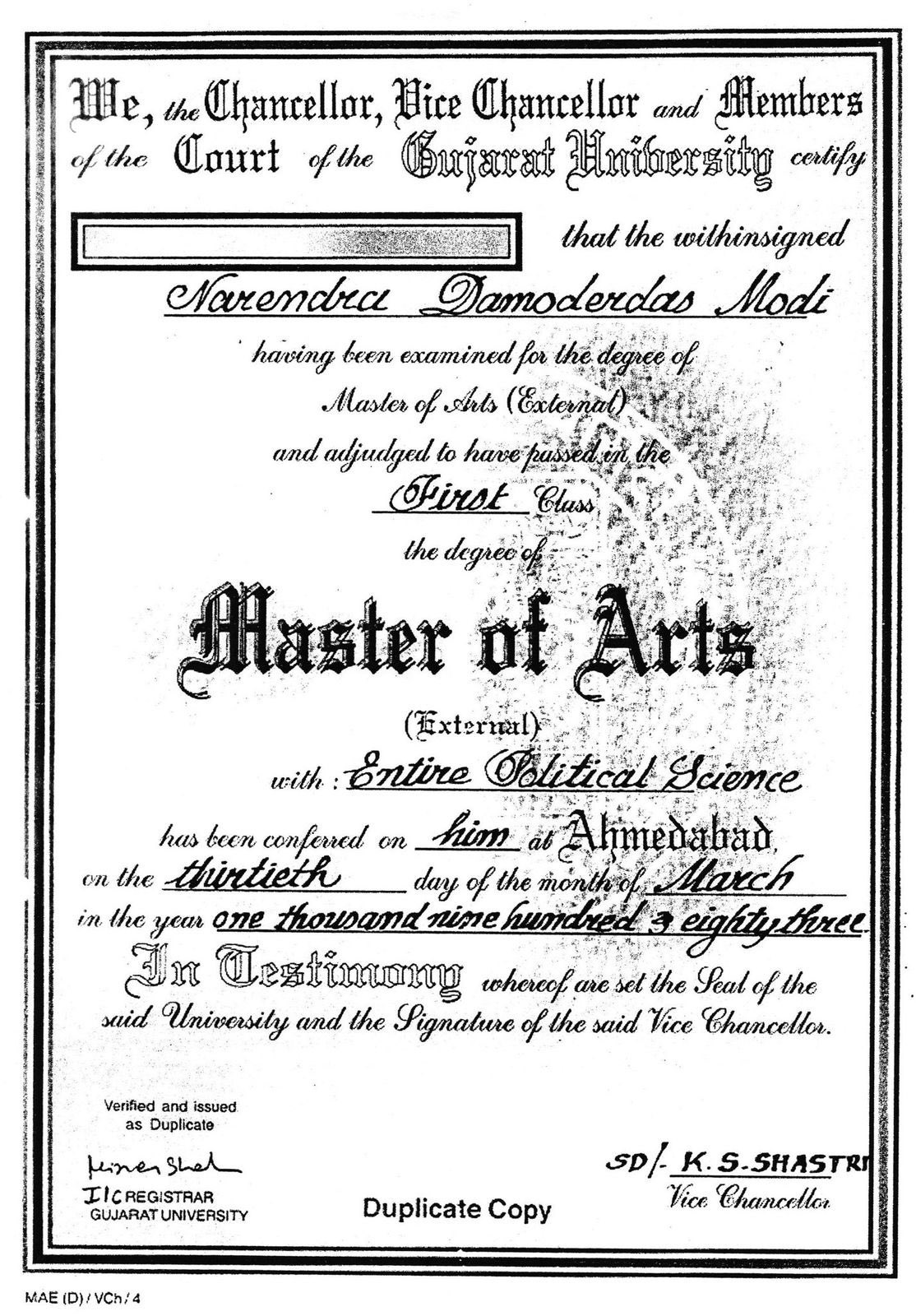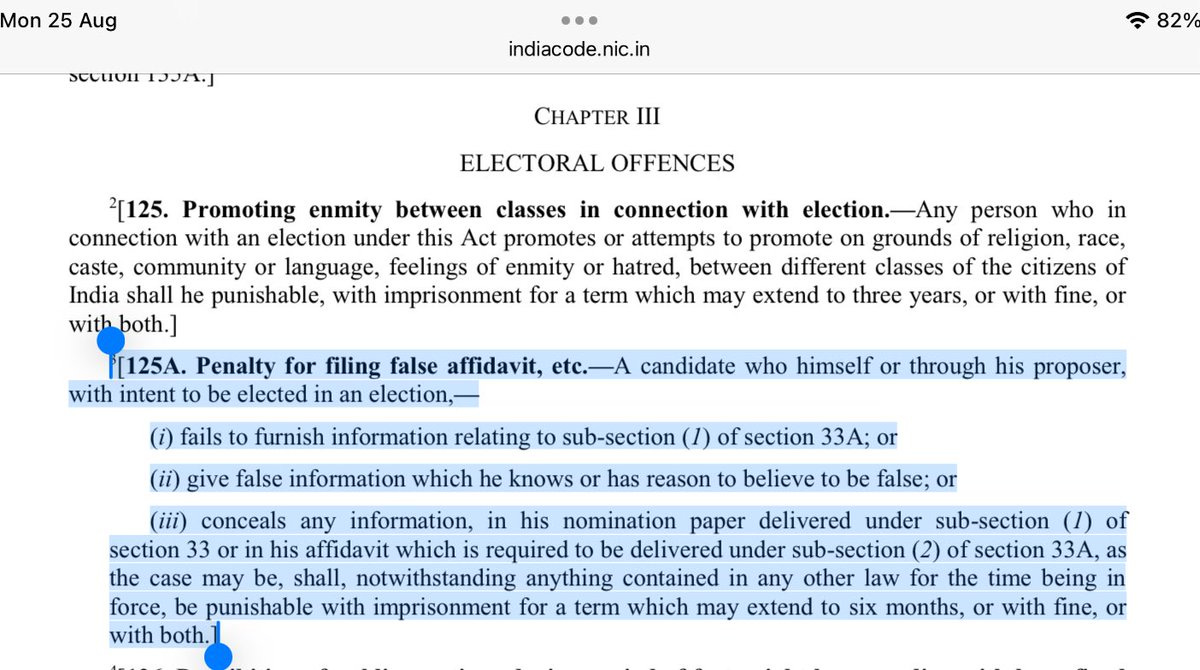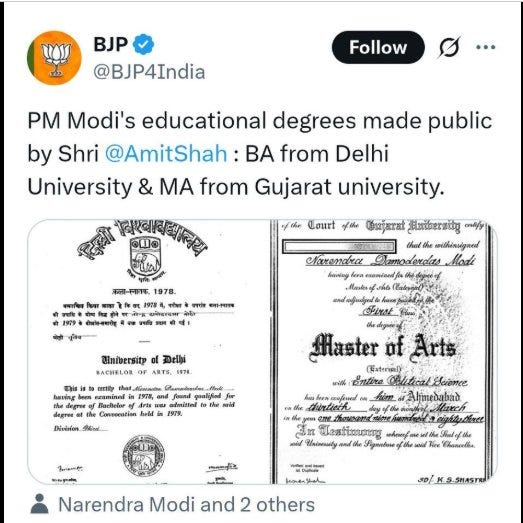Degrees of difficulty
Modi’s degree certificates are public when politically convenient and private when legally tested. The Delhi High Court’s ruling says more about transparency than any certificate ever could.
Yesterday, August 25, the Delhi High Court did a curious thing.
It ruled that Prime Minister Narendra Modi’s degree certificates, for which a small army of RTI activists, journalists, and opposition politicians have been pestering Delhi University for years, are private information.
Private, even though Amit Shah, then the BJP president, once stood before cameras alongside the late Law Minister Arun Jaitley, and waved Modi’s BA and MA degrees for all to see.
Private, even though anyone contesting an election in India is legally required to declare educational qualifications in their affidavit, and making false declarations in an election affidavit comes with serious consequences. As below:
Those documents are still to be found on the BJP’s X handle, fossilized proof of a moment when transparency was politically convenient.
So which is it? Public or private? Did DU release the documents Shah and Jaitley flashed? If yes, how did it then breach privacy? And if no, then how did the BJP honchos get hold of these documents (of dubious provenance, but that is another story)? Either way, Modi and the BJP have painted themselves into a corner.
Let’s rewind. In 2016, RTI activist Neeraj Sharma filed an RTI requesting details of all BA students who had passed in 1978 from Delhi university, including their marks and roll numbers. And in May 2016, Delhi’s then CM Arvind Kejriwal accused Modi of lying about his educational qualifications.
In December of that year, the Central Information Commission (CIC) ordered DU to release the register, calling it a public document.
In January 2017, DU appealed to the Delhi High Court, which promptly stayed the CIC order. Solicitor General Tushar Mehta argued at the time that universities hold student records in a fiduciary capacity, and that privacy trumps curiosity.
That was the last we — or at least, I — heard of that, till hearings resumed in February of this year. On February 27, DU told the court that they can present the degree to the judges, but not to “strangers,” citing privacy concerns. A day later, Justice Sachin Datta reserved judgment.
In August, the High Court first deferred its verdict and finally, on 25 August, the Delhi High Court quashed the CIC’s 2016 order, ruling that marksheets, results, and degree certificates all count as “personal information”, protected under Section 8(1)(j) of the RTI Act.
“The fact that a person holds a public office does not, per se, render all personal information subject to public disclosure,” Judge Sachin Datta ruled. And then this:
“Something which is of interest to the public is quite different from something which is in the public interest.”
Very nice. I wish I had the ability to write lines like that. Only, it is very much in the public interest to know whether the Prime Minister lied in his election affidavit. It is neither “idle curiosity or sensationalism”, which is what Judge Datta characterised it as (though to be fair, it would be sensational if it turns out that Modi has been lying all along, across three general elections).
Here’s the rub: Modi, via his party president and his then Law Minister, voluntarily put his degrees in the public domain in 2016. ‘Dono degree sarvajanik karna chahta hoon,” Shah said then. And once you do that, once you voluntarily disclose information, you lose the right to claim that the information is private.
So we now live in a strange Schrödinger’s box: the PM’s degrees are simultaneously public enough to be flashed on national TV when politically useful, and private enough to deny verification when politically awkward.
A friend who had come home this Sunday said, when the subject came up, “Yaar, people do puff themselves off, we all do. Chodo na — there are far more pressing issues to worry about.”
The flaw in that argument is this: It’s one thing for me to tell my friend that I passed my BA double mains (History and Economics) with honors (I didn’t — I dropped out of college). But it is quite another to make that claim on, say, a job application — if I am found out, I get summarily sacked. And Modi was, through his affidavit, applying for the most high profile job in the land.
Every affidavit filed by every election candidate comes with a promise of transparency. The candidate is declaring: here’s who I am, here is what I studied, here is what I am worth. But if institutions decide they don’t have to verify any of it because “privacy,” then what are affidavits worth?
We’ve turned disclosure into theatre: flashy gestures when it suits us, bureaucratic opacity when it doesn’t. RTI, meanwhile, is left toothless, its sharp edges dulled by endless exemptions.
The thing that strikes me about this controversy is this: such things don’t spark outrage anymore.
Maybe because this daily drip feed of the government’s sins of omissions and commissions — and the convenient distractions the ecosystem drags across the trail — has made us progressively numb, to the point where we just throw up our hands, say “A pox on both your houses”, and turn to the sports pages for relief.
If we cared about structural transparency, we would fix this particular problem with a simple rule: If a declaration is made in an election affidavit, the underlying documents should be verifiable on demand. And every citizen has the right to ask for such verification — because after all, the person who filed the affidavit is asking a plurality of citizens for their vote.
It is not as if Modi’s educational qualifications — or lack thereof — will change our lives for the better, but because it is a litmus test of something larger: the health of our institutions, the consistency of our rules, and our capacity to hold power accountable.
PS: Same friend, same conversation: “Granting everything you say, surely there are bigger issues for you to think about?”
Me: If the Prime Minister lied, repeatedly, about such a non-issue — after all, it is not necessary for you to have BA and MA degrees to aspire to be PM — and if the then party president, now Home Minister, and the then Law Minister forged documents to support that lie, then how do you take anything this PM, and his party, says at face value?
PPS: Remember this?
“Inaugurated Vantara, a unique wildlife conservation, rescue and rehabilitation initiative, which provides a safe haven for animals while promoting ecological sustainability and wildlife welfare” — Narendra Modi, on X.
It turns out that the Supreme Court has now ordered the constitution of a Special Investigation Team to inquire into the affairs of Vantara. The SIT has to inquiry into, among other things, the compliance with the provisions of the Wildlfie Protection Act and other relevant statutes in the acquisition of animals from India and abroad, particularly elephants.
Word doing the rounds is that the Ambanis pissed off the ruling dispensation somehow. One theory suggests that Mukesh Ambani has, behind the scenes, been leaking damaging information about Gautam Adani and his business activities to US investigators. Another suggests that the Observer Research Foundation, run by Reliance, has been running its own foreign policy.
“Enter Rumour, painted full of tongues”.
If Ambani has in fact rubbed the ruling dispensation the wrong way and if this is payback, I’d suggest that the BJP has shot itself in the foot — this pushback will invite retaliation, and the battle will spiral in ways where everyone involved emerges covered in excreta.





Re "I’d suggest that the BJP has shot itself in the foot — this pushback will invite retaliation, and the battle will spiral"
I'm afraid this will turn out to be wishful thinking. Expectations of pushback never seem to come to anything
He was brand building during his early days as PM, and what better way than a rags to riches story to get into the hearts of the masses. A certificate or two to embellish his image as an educated man, has landed him in hot water.
The very denial to allow the certificates for public scrutiny, and the extent to which the government machinery is willing to go to scupper it is enough of an answer.
His legacy is too cemented now for him to suffer the ignominy of being caught on the wrong foot, and therefore this 'at all costs' endeavour, to thwart it.